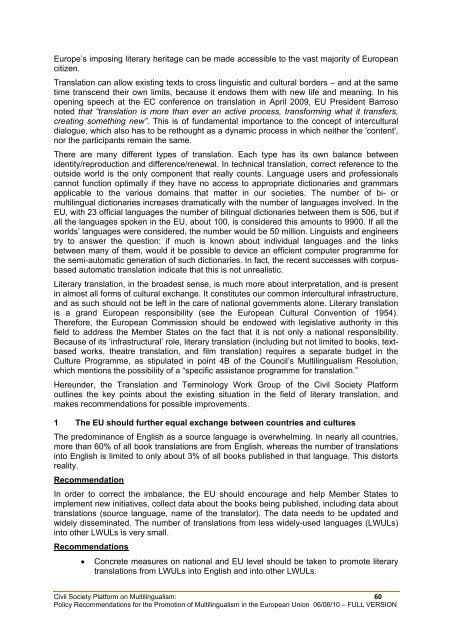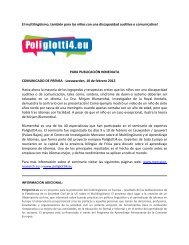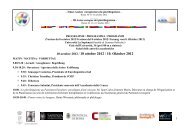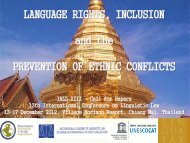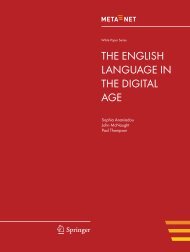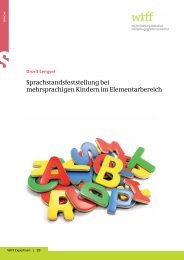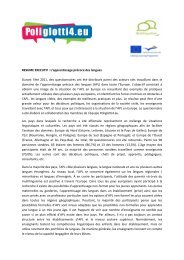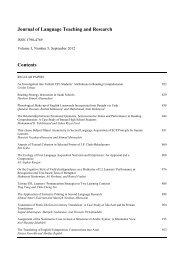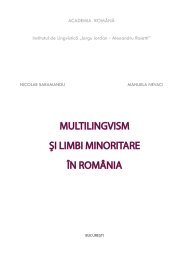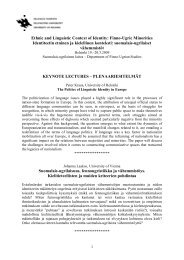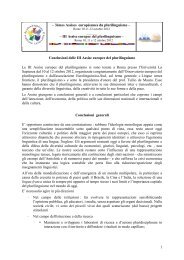FULL VERSION - European Commission - Europa
FULL VERSION - European Commission - Europa
FULL VERSION - European Commission - Europa
You also want an ePaper? Increase the reach of your titles
YUMPU automatically turns print PDFs into web optimized ePapers that Google loves.
Europe’s imposing literary heritage can be made accessible to the vast majority of <strong>European</strong>citizen.Translation can allow existing texts to cross linguistic and cultural borders – and at the sametime transcend their own limits, because it endows them with new life and meaning. In hisopening speech at the EC conference on translation in April 2009, EU President Barrosonoted that “translation is more than ever an active process, transforming what it transfers,creating something new”. This is of fundamental importance to the concept of interculturaldialogue, which also has to be rethought as a dynamic process in which neither the 'content',nor the participants remain the same.There are many different types of translation. Each type has its own balance betweenidentity/reproduction and difference/renewal. In technical translation, correct reference to theoutside world is the only component that really counts. Language users and professionalscannot function optimally if they have no access to appropriate dictionaries and grammarsapplicable to the various domains that matter in our societies. The number of bi- ormultilingual dictionaries increases dramatically with the number of languages involved. In theEU, with 23 official languages the number of bilingual dictionaries between them is 506, but ifall the languages spoken in the EU, about 100, is considered this amounts to 9900. If all theworlds’ languages were considered, the number would be 50 million. Linguists and engineerstry to answer the question: if much is known about individual languages and the linksbetween many of them, would it be possible to device an efficient computer programme forthe semi-automatic generation of such dictionaries. In fact, the recent successes with corpusbasedautomatic translation indicate that this is not unrealistic.Literary translation, in the broadest sense, is much more about interpretation, and is presentin almost all forms of cultural exchange. It constitutes our common intercultural infrastructure,and as such should not be left in the care of national governments alone. Literary translationis a grand <strong>European</strong> responsibility (see the <strong>European</strong> Cultural Convention of 1954).Therefore, the <strong>European</strong> <strong>Commission</strong> should be endowed with legislative authority in thisfield to address the Member States on the fact that it is not only a national responsibility.Because of its ‘infrastructural’ role, literary translation (including but not limited to books, textbasedworks, theatre translation, and film translation) requires a separate budget in theCulture Programme, as stipulated in point 4B of the Council’s Multilingualism Resolution,which mentions the possibility of a “specific assistance programme for translation.”Hereunder, the Translation and Terminology Work Group of the Civil Society Platformoutlines the key points about the existing situation in the field of literary translation, andmakes recommendations for possible improvements.1 The EU should further equal exchange between countries and culturesThe predominance of English as a source language is overwhelming. In nearly all countries,more than 60% of all book translations are from English, whereas the number of translationsinto English is limited to only about 3% of all books published in that language. This distortsreality.RecommendationIn order to correct the imbalance, the EU should encourage and help Member States toimplement new initiatives, collect data about the books being published, including data abouttranslations (source language, name of the translator). The data needs to be updated andwidely disseminated. The number of translations from less widely-used languages (LWULs)into other LWULs is very small.RecommendationsConcrete measures on national and EU level should be taken to promote literarytranslations from LWULs into English and into other LWULs.Civil Society Platform on Multilingualism: 60Policy Recommendations for the Promotion of Multilingualism in the <strong>European</strong> Union 06/06/10 – <strong>FULL</strong> <strong>VERSION</strong>


